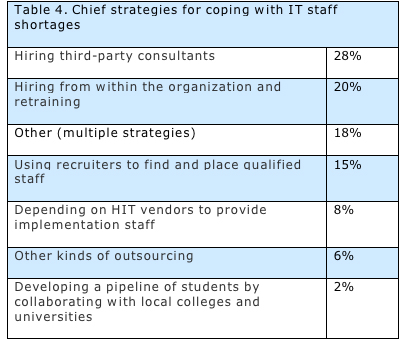The need for IT staff in the nation's healthcare facilities is more critical now than two years ago,with two-thirds of healthcare operations in the U.S.reporting a shortage,according to a survey of CIOs(download PDF).
The survey,conducted in July by the College of Healthcare Information Management Executives(CHIME),shows that 67%of 163 hospitals or healthcare systems(with multiple hospitals)surveyed face a shortage of IT staff.That's higher than in 2010,when a similar survey by CHIME showed that 59%of those surveyed reported a shortage.
As in 2010,respondents said they particularly need specialists for implementing and supporting clinical applications,such as electronic health records(EHRs)and computerized order entry systems.
Seventy-four percent said they need personnel who can perform clinical software implementation and fill IT support staff positions.
"Even with two years of focused attention on implementing electronic health records at the nation's hospitals in response to federal incentives,it's clear that staffing is a significant concern for IT executives,"said Randy McCleese,vice president of information systems and CIO at St.Claire Regional Medical Center,in Morehead,Ky."Staff needs aren't likely to abate over the next couple years,as CIOs continue to push to achieve meaningful use targets and switch to ICD-10-compliant applications."
The overwhelming majority of CIOs surveyed,however,said that staffing shortages were small.Seventy-one percent reported vacancy rates of less than 10%in their IT departments.
Respondents to the latest survey indicated that strategies for dealing with shortages haven't changed much.Most are hiring third-party consultants to find new talent,although that percentage is down slightly from 2010.
In this year's survey,85%of CIOs said they worry about retaining IT staff,up from 76%of respondents who said that in 2010.Current concerns about retention may reflect apprehension over the growing number of IT projects,which include e-health record rollouts,ICD-10 planning in advance of the eventual use of ICD-10 codes,health information exchange initiatives and other efforts that involve IT and affect hospital operations.
"Retention is important because information systems need constant care and attention once they're implemented,"said George McCulloch,deputy CIO at Vanderbilt University Medical Center,Nashville,Tenn."Clinical systems are complex,are regularly being updated,and new clinical staff must be trained to use them as well.Being able to retain IT staff familiar with an organization's systems is crucial for CIOs."
The healthcare industry is leading the market in IT job creation,according to the U.S.Bureau of Labor Statistics job placement services.
The bureau indicated that IT jobs in healthcare are expected to grow by 20%annually through 2018,"much faster than average."There are currently 176,090 healthcare IT jobs,according to the agency.
 How healthcare CIOs are finding IT talent.
How healthcare CIOs are finding IT talent.





